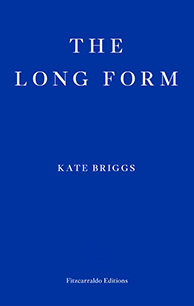The Long Form

It’s early morning and there’s a whole new day ahead. How will it unfold? The baby will feed, hopefully she’ll sleep; Helen looks out of the window.
The Long Form is the story of two people composing a day together. It is a day of movements and improvisations, common and uncommon rhythms, stopping and starting again. As the morning progresses, a book – The History of Tom Jones by Henry Fielding – gets delivered, and the scope of the day widens further.
Matters of care-work share ground with matters of friendship, housing, translation, aesthetics and creativity. Small incidents of the day revive some of the oldest preoccupations of the novel: the force of social circumstance, the power of names, the meaning of duration and the work of love.
With lightness and precision, Kate Briggs renews Henry Fielding’s proposition for what a novel can be, combining fiction and essay to write an extraordinary domestic novel of far-reaching ideas.
About the author
Kate Briggs grew up in Somerset, UK, and lives and works in Rotterdam, NL, where she founded and co-runs the writing and publishing project ‘Short Pieces That Move’. She is the translator of two volumes of Roland Barthes’s lecture and seminar notes at the Collège de France: The Preparation of the Novel and How to Live Together, both published by Columbia University Press.
The Long Form follows This Little Art, a narrative essay on the practice of translation. In 2021, Kate Briggs was awarded a Windham-Campbell Prize.
Judge Maddie Mortimer on The Long Form
"An exquisite study of care and attention, The Long Form explores the mysterious, often unbridgeable gulf between daily life and narrative fiction like nothing else.
"Playing out over a day in the life of a mother and her baby, the novel moves seamlessly between their waiting, walking, washing and reading, to the history of literary theory - domesticating (and therefore democratising) what can often feel like a remote or high-minded tradition.
"Written in crystalline prose as tender as it is precise, as clean as it is challenging, this is the most thorough investigation of what the novel, as form, can really do; it asks who or what it is for, how it may or may not interact with our various realities, how it holds time and space and might better equip us to make sense of the world beyond the page. Kate Briggs has created a quietly radical masterpiece."